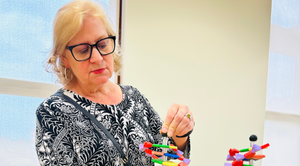PUBLISHED: 19th October 2023

by Laura A. Logie, PhD
Nueva Vida (New Life) is a community-based, non-profit organization providing culturally sensitive and competent cancer care services that support the Latino immigrant community. We work tirelessly to tackle the myriad of obstacles faced by Latinos whose lives are affected by cancer, including cultural, linguistic, access to health care and psychosocial barriers.
As a partner of FORCE and Mission Partner with Bright Pink, we launched De Madres a Hijas (from Mothers to Daughters) at the intersection of Hispanic Heritage Month (September 15-October 15) and Breast Cancer Awareness Month (October). The overarching intervention goal of De Madres a Hijas is to increase adult Latina mothers’/daughters’ knowledge and awareness of hereditary breast and ovarian cancer (HBOC) risk, enhance their talking with relatives about familial HBOC risk and develop an action plan for making educated decisions about their own health.
Why De Madres a Hijas?
Barriers to equitable access and appropriate care coordination stand in the way of achieving equity in cancer care and delivering high-quality care to all patients with cancer. Notable advances in cancer prevention, cancer screening, genetic testing and counseling and the development of effective cancer treatments have contributed to improvements in outcomes for patients with cancer. However, the benefits of these advances are not shared equally, and great disparities persist in cancer outcomes by race/ethnicity, socioeconomic status, language and immigration status.
Among different populations of women diagnosed with breast cancer, Latinas have the highest rate of BRCA1mutations after Ashkenazi Jews. Yet, this community has been largely left out of most HBOC interventions. Research indicates that intergenerational, family-based health interventions effectively leverage cultural values and combat mistrust, laying the groundwork for learning and preventive action. Limited research has explored whether this type of culturally tailored intervention could lead to increased knowledge and prevention for Latinas at high risk for breast and ovarian cancer.
De Madres a Hijas is the first culturally tailored, intergenerational pilot initiative for first-generation Latina mothers with breast or ovarian cancer and their Latina daughters ages 18-45 who may be at risk for HBOC.
What Have We Learned?
Our first De Madres a Hijas cohort included 10 mothers and daughters. Mothers ranged from 43-60 years of age, with a mean age of 49 years. They represented Mexico, Panama, El Salvador and the Dominican Republic. All had been diagnosed with breast cancer; two had Metastatic Breast Cancer. Daughters ranged in age from 18-27 years of age, with a mean age of 22 years, and were born in the United States, Panama, Mexico and the Dominican Republic.
Overall, the increase in HBOC knowledge among both mothers and daughters increased from 8.4 to 12.3, as measured by pre-post means.
All of the daughters expressed that participating with their mothers in these sessions changed the perception they have of their mothers. Having more information about what their mothers went through made them realize or reminded them how strong and resilient their mothers are. It also helped them to be more mindful of how hard it had been for them to overcome the challenges cancer had put in their way.
Motivated by De Madres a Hijas to do a self-exam, a 45-year-old Mexican mother detected a breast change at a very early stage. Although she didn't feel anything unusual when she explored her breasts, she felt pain and noticed something different in one of her nipples. Empowered, she went to the doctor and requested advanced exams. A biopsy performed a week later found a cyst.
Genetic counseling, genetic testing and follow-up care need to be expanded and customized for members of all racial/ethnic groups. Women who are aware of their family history of cancer are more inclined to engage in risk reduction. However, due to the cultural norms and mistrust of an historically inequitable healthcare system, these lifesaving conversations often don’t happen within the Latina community. Nueva Vida hopes the De Madres a Hijas program will break this pattern. We want to ensure that all Latina mothers and daughters are armed with the HBOC knowledge they need.
POSTED IN: Genetic Testing , Health Equity And Disparities , Screening And Prevention , Diversity And Inclusion , Partnerships , Featured Partner
TAGS: Breast Cancer , Ovarian Cancer , HBOC , Early Detection , Patient Advocacy , Health Disparities , Health Equity , Women Of Color , Minority Cancer Awareness , Partner